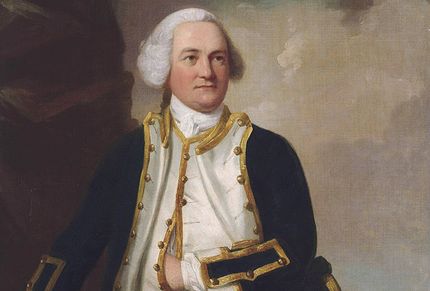In 1775, the Royal Navy sent a fleet to Falmouth, Maine, the site of modern-day Portland, and rained heated shells down on it for eight hours, burning nearly the entire town to the ground—but also pouring tinder onto the burgeoning flames of American rebellion.
The idea was to cow the rebels into submission, but it was basically a Revolutionary Pearl Harbor.
The struggle leading up to the burning of Falmouth began with the rebels and smugglers in the colonies blowing off British taxes. A 26-ship fleet was sent to back up the revenue collectors, but they had over 1,000 miles of coastline to patrol, and their efforts were largely unsuccessful.
Related: This European City Has Been Destroyed by Invaders 44 Times
Meanwhile, Maj. Gen. George Washington and his 16,000-man army had the 6,000 British troops under Lt. Gen. Thomas Gage pinned up near Boston. The British were getting frustrated as rebel colonialists repeatedly embarrassed one of the most powerful militaries in the world.
Amidst all this tension and simmering violence, rebels in Falmouth captured multiple British merchant ships as well as the commander of one of the ships of that 26-ship fleet sent against them, Lt. Henry Mowat, in May, 1775. He was held for ransom for a few days, but returned to his ship after town leaders pressured the rebel leader.

Vice Adm. Samuel Graves
Photo Credit: Wikimedia CommonsSo, when the British senior command sent orders to the fleet to conduct whatever operations were necessary to quell the rebellion, Vice Adm. Samuel Graves ordered the elimination of whatever rebellious sea port towns that the Royal Navy could reach. Multiple towns were selected, including ones where residents had kidnapped or killed British officers.
Mowat returned to the town of Falmouth with four ships sporting over 20 cannons and ordered the town to evacuate before he destroyed it. The town petitioned for mercy, and Mowat conceded to delay the attack as long as all arms and powder, including artillery and gun carriages, were turned over and the residents swore an oath of loyalty.
Related: 11 Fascinating Netflix History Documentaries Streaming Now
Falmouth quietly turned over a few muskets, but then everyone just evacuated quietly. No one was giving an oath to the Mad King. At 9:00 A.M. on October 18, Mowat ordered the final evacuation. At sometime before 10:00 A.M., he ordered the flotilla to open fire, even though people were still visibly making their way out of town.
For the next eight hours, the ships heated cannonballs in their ovens, got them red hot, and sent them into the wooden buildings of the town. Whenever a neighborhood of the town failed to catch fire, the ships landed marines and had them get the job done up close.
A group of armed town residents attempted to put out some of the flames, and the winds were on their side, but the construction of the town made it nearly impossible. The town consisted of hundreds of wooden buildings, most of them packed tightly together. Fire spread from building to building, slowly but steadily.
The armed firefighters fought a group of Marines and sailors in the early afternoon. Two British service members were wounded, but they successfully set the defended buildings on fire.
In the end, over 400 buildings were destroyed, many of them homes or places of business. 1,000 people were left homeless and destitute.
Related: Portraits in History: The Best David McCullough Books
Colonial leaders, even many of those formerly loyal to the crown, were pissed. State legislatures and the provincial congress ordered aid, mostly corn and other foodstuffs, sent to the families now forced to weather the Maine cold without shelter.
"In a word," one reverend wrote, "about three quarters of the town was consumed and between two and three hundred families who twenty four hours before enjoyed in tranquility their commodious habitations, were now in many instances destitute of a hut for themselves and families; and as a tedious winter was approaching they had before them a most gloomy and distressing prospect."
The political backlash against the attack was real and immediate. Damage was estimated at 50,000 British pounds—converted to modern U.S. dollars, that's nearly $10 million. Royal subjects in Britain were outraged and those living in America were livid.

Vice Adm. Samuel Graves
Photo Credit: Wikimedia CommonsEven France, which was closely watching the progress of the rebellion in their rival's colonies, was shocked.
Graves, the admiral who ordered attacks on sea ports, was relieved of command and Mowat's career stalled for years afterward.
But the greatest consequences came when former residents of Falmouth, their family members, and other outraged colonial citizens began turning up for duty in colonial militias. Other seaport towns immediately beefed up their defenses, making an attempt against another town nearly impossible to conduct without losses.
Related: 7 of the Best American History Books
By the start of 1776, it was clear that the American rebellion had grown from an effort by an angry minority to throw off a perceived yoke to a growing revolution that would eventually hamstring the British Empire.
Falmouth, for its part, eventually re-built and re-grew into modern Portland, Maine. This was actually the third time the town had to re-build after a major fire, and it would happen a fourth time in the 1800s. The town seal now features a phoenix, for obvious reasons.
More from We Are The Mighty
- Could the U.S. win World War III without using nuclear weapons?
- What happens when military aircraft find your anti-aircraft truck
- Watch Army Special Forces do their own dive training
- Why veterans tapping a drink on the bar is a sign of respect
- Navy's futuristic destroyers might lose their big guns
This article originally appeared on We Are The Mighty.
Featured photo of a 1782 engraving depicting the burning of Falmouth: Wikimedia Commons
